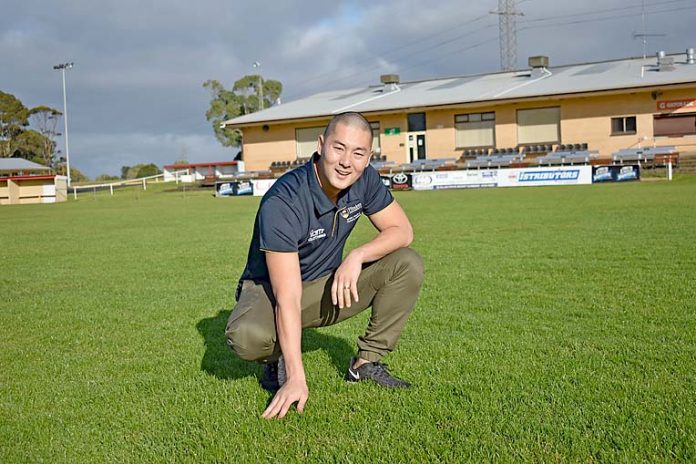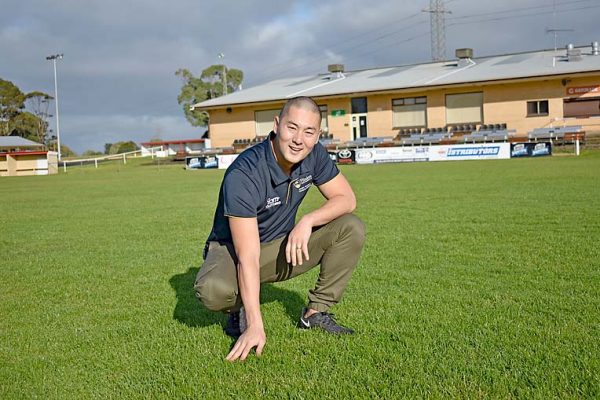

SOUTH Australia’s first study on the ongoing impacts of coronavirus on youth sport will be fronted by former Mount Gambier resident Dr. Sam Elliott.
The 33-year-old is a senior lecturer and researcher with the Sport, Health, Activity, Performance and Exercise (SHAPE) Research Centre at Flinders University and leads a team of investigators to help young players, families and clubs return to sport across the state once the pandemic is over.
Hoping to cover every aspect of youth sport, Dr. Elliott has called out for sporting members across South Australia to take part in the project.
“It is designed specifically to investigate the impact of the pandemic on youth sport in South Australia,” he said.
“We are seeking to speak with parents, coaches, youth athletes (15-18 years) and any administrator or volunteer inside a sporting organisation or club to gain perspective and insight about how the pandemic is impacting sport.”
Dr. Elliott said the research emerged from concerns families and children, especially those who have experienced significant social, psychological and financial loss during the pandemic, may not return.
“The research has come out of a concern that while many people will return to sport across the state, we need to ask questions about who will not return as well, ask ourselves why they are not returning and find ways for sport to re-engage families and young people.”
“We want to take care of young people and make sure they have the opportunity to reap not just the potential physical benefits of sustained sport involvement, but the wide-ranging psychological and social benefits as well.”
Dr. Elliott spent all of his schooling years in Mount Gambier before making the move to Adelaide in 2006.
He has always held a passion for sport after playing football for South Gambier and initially pursuing a Degree to be a Physical Education teacher.
But now Dr. Elliott has become a highly regarded and award winning lecturer and researcher in the field of youth sport and parental behaviour since being appointed to Flinders University in 2014.
In his latest venture, the former Limestone Coast resident said his research team has observed why returning to sport can be difficult.
“From two weeks of data collection, there are strong indications of financial, sociocultural, emotional and logistical challenges with re-engaging families and children back to sport,” Dr. Elliott said.
“Whilst most families and children may be okay with the idea of going back to play when it is safe to, there are a lot who are actively decreasing their involvement or disengaging all together.”
Due to the study covering sports in all corners of the state, Dr. Elliott said it involves multiple research methods.
“The nature of the research involves two phases,” he said.
“The first involves a short online survey, with one available for adults and another for youth participants – this will be available in the coming days.
“It is about getting a surface-level understanding of what is happening and how COVID-19 is impacting families and sporting communities.
“The second phase is what we call the qualitative component.
“It involves interviewing as many people as possible to generate a deeper level of insight into what is actually happening.
“I have been fortunate to speak with a lot of parents, some really talented youth athletes and a lot of club presidents from Mount Gambier to Riverton and Goolwa to Goodwood.”
With many sport research outcomes heavily informed by urban perspectives, Dr. Elliott believes it is vital country areas such as Mount Gambier have their voices heard in projects like his to help all sport participants.
“The nature of most sport research typically involves a predominant metropolitan perspective,” he said.
“But regional voices are often ignored or underrepresented, so it is really important to understand what is happening to families in large regional centres like Mount Gambier where sport in so many ways is the social fabric of community.
“We want to find out what needs to be done to get sport back on its feet and importantly how we can re-engage those who are at risk or have already decided to leave sport.”
Although the findings are expected to be announced in July, Dr. Elliott hopes it will not just be a short-term solution.
He said the group’s study is not only aimed at helping sporting communities recover from COVID-19, but also provide a reference point for future generations returning from catastrophes.
“What we are aiming to do with the project is to publish a paper and develop some protocols and resources that are tailored for sporting individuals, clubs and communities to bounce back after a catastrophe like COVID-19,” Dr. Elliott said.
“It does not matter if it is a bushfire, global recession or a pandemic, if there is a forced closure of sport, we want to make sure athletes and competitions can manage through the period and bounce back once it is safe to do so.”
Currently enjoying a brief period back in the area where he grew up, Dr. Elliott said his project has already received a positive response.
But he is still searching for as many participants as possible, aiming for over 1000 surveys participants over the coming days across the state.
Dr. Elliott is also keen to hear from more parents, coaches and youth from the region via an online interview.
“We have had a good response so far and we would love to hear from more people,” he said.
“I have heard some really contrasting stories as to how the pandemic has impacted parents, families and children.
“Some kids cannot wait to get back into sport, while others may not return.
“There is certainly an appetite to share stories and I encourage anyone in this region to contact me and participate in an online interview.”
Anyone who is interested in taking part can contact Dr. Elliott via email – sam.elliott@flinders.edu.au – to help piece together the return back to on-field action.







